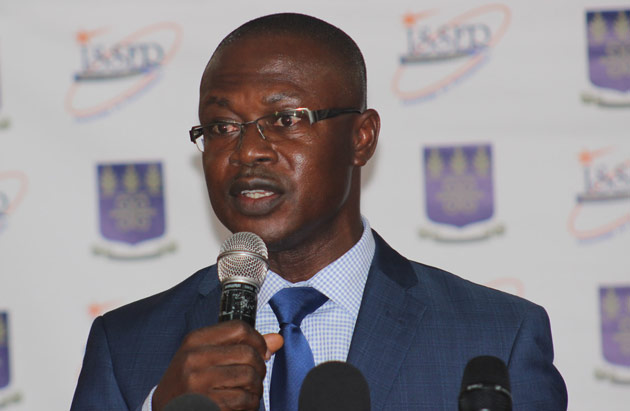Professor Charles Ackah, a lecturer at the University of Ghana’s Economics Department, has criticised policymakers in the agricultural sector for Ghana’s heavy reliance on imports.
In an interview with Bernard Avle on ChannelOne TV, Prof. Ackah stated that Ghana’s leaders only pay lip service to policies aimed at boosting the agricultural sector, with the exception of the late former President Kutu Acheampong, who he credited as the only leader to have taken agriculture seriously.
“When it comes to food imports, I think that is an area we need to have a national conversation. The truth of the matter is that as you rightly said we have one of the most fertile lands blessed by God in all of Africa.
“If you see our attitudes towards agriculture, it’s nothing to write home about. We just play lip service, whether it’s Planting for Food and Jobs, Phase One and Phase Two. I think it’s probably former late President Kutu Acheampong who took something serious with agriculture.
“A country that imports food, basic things like tomatoes, onions, chicken, so many vegetables, from our Sahel neighbours, just shows that the people we put in charge of agricultural policy have failed massively. There’s no proper policy investment for agriculture, if agriculture fails, industries will fail…I think we need to focus on agriculture seriously,” he opined.
The Associate Professor at the Institute of Statistical, Social and Economic Research (ISSER) warned that a country without food sovereignty is vulnerable to trouble.
He condemned the lack of adequate food production in Ghana, despite its arable lands, as a stark “indictment” of the country’s leadership, highlighting the need for self-sufficiency in food production to ensure food security for its citizens.
“In the current insecure global world, which we are in, if you don’t achieve food sovereignty or food security and energy sovereignty, you will be in big trouble. It’s a security issue, it’s a national security issue. That we don’t have a handle, or control to produce what we eat, is an indictment on the leadership of the country.
“When we have so much water resources, we have so much fertile land, the season is good for most part of the Southern part, in Afram Plains. I visited Afram Plains and interacted with the farmers. This current farming season, they are at the mercy of the weather. They are praying basically for rain. Some of them planted maize, and for two or three seasons it was not raining. all those maize seedlings were imported.”
He criticised the government for neglecting to invest in agricultural colleges, thereby hindering their ability to conduct research on resilient seedlings and improve food production in the country.
“We don’t have an investment in research and development like CSIR that can produce strong resilient seeds here. The government is not investing in agricultural colleges, and departments in KNUST, the University of Ghana, University of Cape Coast. So, we import, they have different names that they call them. When you import, they are very expensive,” he said.
Background
According to the Ghana Statistical Service’s 2023 Trade Report, Ghana had a trade surplus of GH₵20.7 billion with other African countries, an increase from GH₵13.2 billion in 2022.
Ten products accounted for over a third (38.3%) of all imports. The highest import value was diesel-automotive gas oil, amounting to GH₵27.1 billion, followed by light oils, motor spirit, and super at GH₵22.3 billion.
These are the only two commodities that contributed over 10.0 percent each of all imports. Ghana imported from 214 countries and exported to 159 in 2023, compared to 208 and 160 respectively in 2022.
Over the period 2022 and 2023, the value of food products exported increased by GH₵3.4 billion. Similarly, food product imports witnessed a rise of GH₵3.6 billion within the same timeframe.
However, the share of food products in all trade has declined from 2022 to 2023, with 2.9 percentage points decline for exports and 0.7 percentage points for imports.
Cocoa products (62.4%) recorded the highest for exports followed by edible fruits and nuts (12.7%). Grains, cereals, meat, animal or vegetable fats and oil, and fish products collectively constitute half (50.4%) of all food product imports into Ghana, reflecting a significant portion of the country’s
Worked but not rolled or flaked cereal grains, rice (packaged over 5kg or in bulk), and shea nuts together account for a quarter (25.4%) of all food products imported into Ghana.
Following closely behind are frozen cuts and offal of fowl, sugar, and guts, bladders and stomachs of animals, each representing more than 5.0 percent of food imports.
In contrast to the trade deficit of GH₵4.8 billion experienced in 2022, Ghana recorded a surplus of GH₵5.3 billion in 2023.
Shea nuts represented 82.3 percent of the total imports from Burkina Faso, with an import value of GH₵1.9 billion. Compared to 2022, the only change in the top five import origins within Africa is Burkina Faso replacing Nigeria in 2023. Notably, Burkina Faso predominantly supplies vegetable products, constituting 89.8% of imports.

